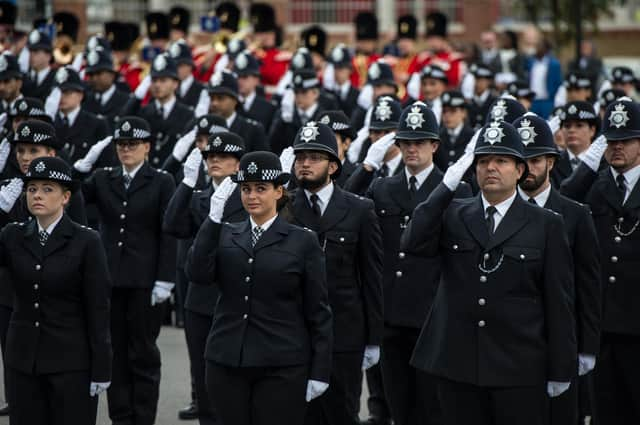A secretive culture of violence is warping male attitudes to sex – Joyce McMillan


These days, of course, the “canteen” tends to be a virtual one, located in this case on a WhatsApp chat group. Yet the issue remains the same – a “jokey” sub culture, not only in the Met but elsewhere, which expresses repulsive views about women and various minority groups, marginalises those who do not go along with it, and is of growing concern to women and other groups across society.
Even on Woman’s Hour, though, not everyone agrees; one listener emails the programme to say that officers involved in such groups are only “letting off steam”, an activity which he says is inevitable, given the levels of risk and threat they face in the course of their work. He does not use the word “banter”, but he might as well; and he adds that those trying to change the culture are wasting their time.
Advertisement
Hide AdAdvertisement
Hide AdAll of which only helps to highlight the huge difficulty some traditionally male-dominated organisations are still experiencing, in moving on into a world which tries to make equality a reality, and – in particular – takes violence against women seriously.
This week’s crisis at Raith Rovers – where the club first signed a player found responsible for rape in a civil court, and then rethought its position following following furious protests led by the club’s most prominent supporter and sponsor, Val McDermid – is another prime example of the depth of the culture clash over these issues, and of the bitterness of the current debate around gender and sexual politics in the UK.
On one hand, in the aftermath of the #metoo movement, women are becoming ever more angry about failures to deal with systemic violence against women, with appallingly low rape conviction rates, and with chronic harassment, hate speech and threats against women in public spaces, and in public life.
On the other hand, the internet is rife with sites and chat groups encouraging men to ‘fight back’ against the supposed feminist takeover of the world, and to reassert their right to treat women as a subordinate sex, deserving punishment when they fail to meet men’s needs and demands.
Advertisement
Hide AdAdvertisement
Hide AdAnd this is to say nothing of a porn culture, often massively consumed by children from puberty upwards, which encourages many of these latter attitudes, as well as creating completely unrealistic expectations about human bodies, their looks and capabilities.
So is there any way forward, given the depth of this stalemate between the growing anger of women, and the growing anti-feminist backlash among some men – including some defenders of this week’s Raith Rovers signing?
At one level, it seems fairly obvious that there are grounds for hope, given the much more positive role models of 21st century masculinity offered by sportsmen such as Marcus Rashford and Andy Murray, among others; there is huge value in the images they present of male strength used not to bully or hurt, but to help those less privileged.
It also seems clear, though, that those positive influences can only thrive if they are accompanied by serious efforts to counter the brutal sexual sub-culture of rape jokes and pornographic imagery that still thrives on the internet, and in real life.
Advertisement
Hide AdAdvertisement
Hide AdIn essence, it’s a culture that encourages men both to treat their own sexuality as something dirty and dangerous, not fit for public discussion, and greatly to exaggerate its power.
The idea that men cannot control their own sexuality, and cannot be expected to, is central both to the victim-blaming of traditional patriarchal culture, and to the kind of canteen culture which assumes that men or boys “letting off steam” must include a licence to express the most revolting violent fantasies about women they encounter, including female colleagues.
The assumption that this toxic mixture of shame and aggression is a normal expression of male sexuality, and therefore must be tolerated, is one that needs to be vigorously challenged, both socially, and in whatever sex education our overtaxed school system and wider society can offer.
And finally, it is also worth considering conflict between the sexes as an aspect of a general increase in tension in our society, caused primarily by 40 years of economic policy deliberately designed to reduce our sense of economic security and stability.
Advertisement
Hide AdAdvertisement
Hide AdAs women know only too well, equality flourishes in societies with high levels of public provision, and withers and dies in societies starved of that basic investment in human well-being; and men and women will struggle to value one another as equals in a culture that – often for pure commercial profit – mounts constant assaults on their security and self-esteem, while also offering an online diet of ever more extreme and emotionally barren images of sexual activity, as if they represented something to which people should aspire.
If our society wants to make real progress on changing attitudes to violence against women, then it needs to become more vigorous and explicit in talking about sex as a positive and life-enhancing force, rather than one inevitably bound up with some secretive culture of violence and transgression.
We need to encourage men to see themselves as adults in control of their sexual impulses, not perpetual boys to be indulged and forgiven, even when they are evidently not sorry.
And we need a governing ideology based not on bullying, exploitation and toxic forms of competition, but on a collective determination to work together to build a sustainable future for our children and grandchildren; a task in which everyone, regardless of gender, should have a role, and from which no-one need feel excluded, once the real work begins.
